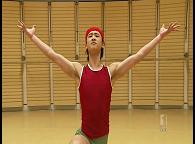
Download This year, the Australian Ballet is celebrating its 50th anniversary.
One of its most high profile stars in recent decades was Chinese-Australian Li Cunxin who was immortalised in the film Mao's Last Dancer.
Now a new Chinese-Australian star, Chengwu Guo, is rising through the ranks.
Sarah Dingle of Radio Australia reports.
Morning rehearsals at the Australian Ballet, and there that's not a tutu in sight.
Instead, there's an all-boys club on stage - among them, new soloist Chengwu Guo.
“He's explosive. He's one of those dancers that completely lights up the stage. And not only is his physical ability amazing, he has a great emotional depth as well.”
At just 22, Chengwu Guo is one to watch.
In Australia, he's matched energy with technique to international acclaim, but he began his career on the other side of the globe.
David McAllister, artistic director of the Australian Ballet;
“He really has this amazing quality that I guess comes from his training, which is quite different to our guys and his experience.”
“Originally from south China... a very beautiful city. Based 1,000 kilometres away from Beijing, so I had to leave home when I was about 10,” says Chengwu.
Learning his first steps at the Beijing Dance Academy he soon excelled, winning the international Prix de Lausanne competition, which gave him the right to join any ballet school in the world.
“I was only 16 years old, so I didn't know of course where I should go, what country ballet is good or suits me for my future. I just asked my teacher, I said, "Where I should spend my scholarship at?" and my teacher said "Australia." Very, very just like - one word, "Australia."
Chengwu Guo's journey echoed that of another Beijing dance academy student, Li Cunxin who was immortalised in the film Mao's Last Dancer.
“I still remember when I first met him Chengwu, my heart felt for him because I really understood how difficult, how challenging that is, to not be able to speak a language, not be able to understand the Australian culture.”
“Li is just my father. He is a famous man in China. I heard his name ages ago. Finally, after 16 years of living in this mould, I get to see him,” Chengwu adds.
“His training and my training are very similar, from the same training syllabus. I think his time was probably slightly easier than mine. You know, mine was very strict, very disciplined,” says Li.
Li Cunxin defected from the People's Republic of China in 1981, eventually ending up with the Australian Ballet as principal artist.
His story became the award-winning film Mao's Last Dancer. The teenage Li was played by none other than Chengwu Guo.
“People like me or people like Chengwu come from China where they have grown up with very little. And a lot of hope, but not much, not many opportunities. So they really have to work hard for this opportunities - or when this opportunity does come, they really just pour their heart and soul into making something out of it.”
And there's no denying that Chengwu Guo has done just that.
He is the only member of the Australian Ballet who can claim to have entered and won the Chinese version of So You Think You Can Dance.
“I couldn't do any ballet. And you know, because most people don't do it. So I had to... every time when we go out on stage, we always do either hip-hop or do Latin or jazz. It was big challenge for me. And I really, really enjoyed it.”
Last month, he became the first man to win both the Australian Ballet's major awards for young dancers, scooping a cash prize which he says will go towards bringing his parents to live in Australia.
“When he told me about that, I think I just... my heart smiled. I know how much it meant to him to be closer to his parents. And he's the only child in the family, so I know he constantly worries about his parents, and they are his world.”
“Loyalty in China means the sign of a man. So we have to keep the loyalty and be nice to parents. And also, no betray to friends. Because Australian Ballet treats me so well, so yeah, I will be always loyal to them.”
It's a sentiment which the company returns in full.
“Chengwu's career is enormous. It will be enormous. And he will have fantastic success. We look forward to watching and helping him make those dreams come true,” David concludes.












